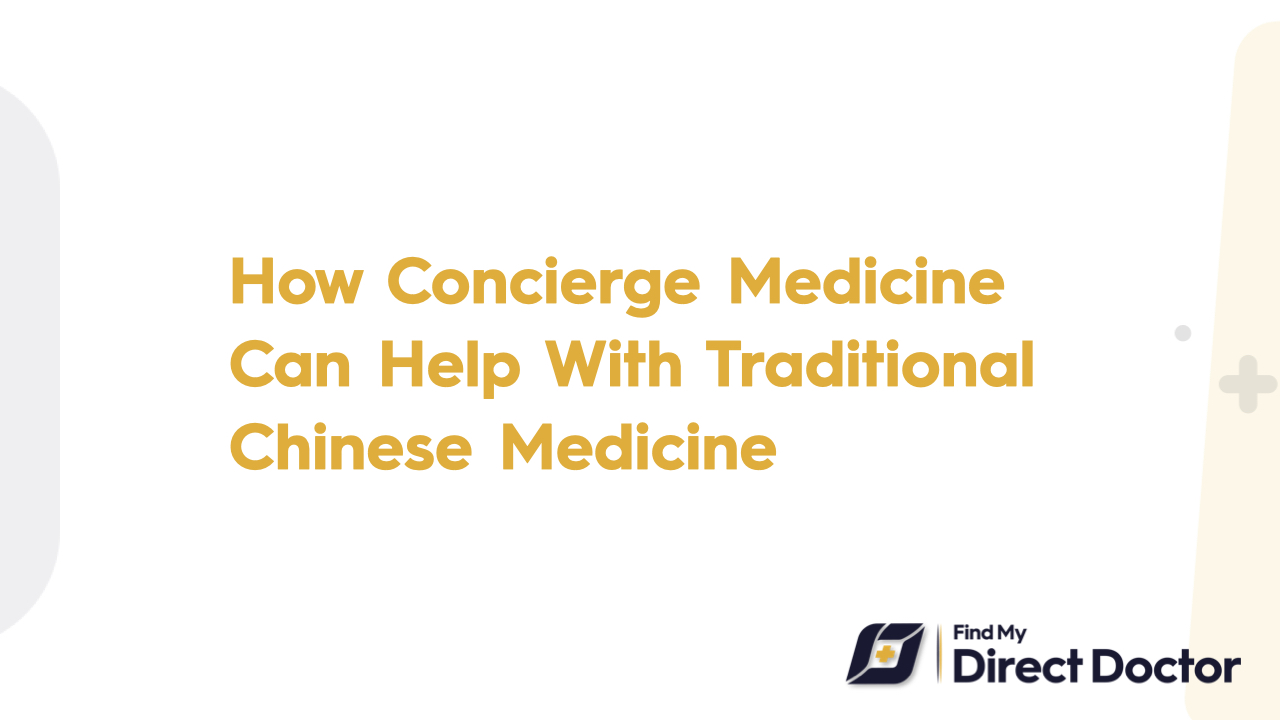



Traditional Chinese Medicine (TCM) is an ancient healing system that has evolved over thousands of years, integrating various practices such as acupuncture, herbal medicine, dietary therapy, and tai chi. TCM is based on the philosophy that the body is a complex system where physical health, emotional well-being, and environmental factors are interconnected. It seeks to restore balance within the body by addressing the root causes of ailments rather than merely alleviating symptoms. As interest in holistic healthcare grows, the incorporation of TCM into the concierge medicine model offers patients a unique approach to health that prioritizes personalized care.

The Traditional Chinese Medicine procedure involves a comprehensive assessment of the patient’s health using a holistic framework. Practitioners typically begin with a detailed consultation, gathering information about the patient's medical history, lifestyle, emotional state, and specific symptoms. This thorough evaluation may also include pulse diagnosis and tongue examination, two distinctive practices in TCM that provide valuable insights into the patient’s overall health and internal imbalances.
Once the practitioner has gathered sufficient information, a tailored treatment plan is developed. This may include various modalities such as acupuncture, which involves the insertion of fine needles at specific points on the body to promote the flow of Qi (life force energy) and restore harmony. Herbal medicine is another essential aspect of TCM, where practitioners prescribe custom herbal formulas to address specific health concerns. Additionally, dietary recommendations and lifestyle modifications are often suggested to support the patient's healing process.
TCM procedures are characterized by their individualized nature. Each treatment is specifically designed to meet the unique needs of the patient, reflecting the belief that no two individuals are alike, even if they present with similar symptoms. The ultimate goal of TCM is to promote holistic health, enhance the body’s self-healing capabilities, and restore equilibrium to both physical and emotional well-being.
Integrating Traditional Chinese Medicine into the concierge medicine model offers numerous benefits, enhancing the patient experience and overall treatment effectiveness. One of the primary advantages of this approach is the emphasis on personalized care. Concierge practitioners typically maintain smaller patient loads, allowing them to dedicate more time to understanding each patient's unique health concerns and goals. This level of attention fosters a deeper practitioner-patient relationship, essential for the success of TCM.
Concierge medicine also facilitates greater accessibility to TCM practitioners. Patients can enjoy direct lines of communication with their healthcare providers, enabling them to ask questions, seek guidance, or schedule appointments with ease. This open dialogue fosters a collaborative environment, where patients feel empowered to participate actively in their treatment process.
Another significant benefit is the coordination of care within the concierge model. For patients who may be combining TCM with conventional treatments, having a concierge practitioner ensures that all aspects of their healthcare are harmonized. This integrated approach helps mitigate potential conflicts between different treatment modalities and supports a cohesive strategy for managing health.
Moreover, concierge medicine often includes holistic wellness services that extend beyond TCM. Patients may gain access to wellness coaches, nutritionists, or mindfulness practitioners, enhancing their overall health experience. This multifaceted support aligns with TCM's philosophy of treating the body, mind, and spirit as interconnected elements.
Preparing for a Traditional Chinese Medicine procedure in a concierge setting involves a comprehensive approach to patient education and individualized planning. Prior to commencing treatment, practitioners take the time to explain the principles of TCM, what patients can expect during the process, and how to optimize their experience. This understanding alleviates concerns and promotes confidence as patients embark on their healing journey.
In addition to initial consultations, concierge practitioners emphasize the importance of lifestyle and dietary modifications tailored to the patient's specific health concerns. By offering personalized wellness plans that may include dietary adjustments or exercise recommendations, practitioners help patients prepare effectively for their TCM treatments. This proactive approach fosters a sense of ownership in their health journey, contributing to a more favorable treatment outcome.
Recovery following TCM procedures is also supported through comprehensive follow-up care. Concierge practitioners prioritize regular check-ins with their patients, allowing for ongoing assessment and adjustments to treatment plans. These follow-up appointments may occur in person or via telehealth, providing flexibility and convenience for patients.
Furthermore, concierge medicine provides resources that extend beyond the clinical setting. Patients may have access to workshops, support groups, or educational materials that further enrich their understanding of TCM principles. This holistic approach reinforces the interconnectedness of physical, emotional, and mental health, empowering patients to take an active role in their healing journey.
In conclusion, the integration of Traditional Chinese Medicine within the concierge medicine model creates a patient-centered approach that prioritizes individualized care and holistic well-being. Through personalized treatment plans, accessible communication, and comprehensive preparation and recovery support, patients can experience a transformative healing journey. This collaboration not only enhances the effectiveness of TCM but also empowers individuals to embrace a proactive approach to their health, leading to improved vitality and overall wellness.